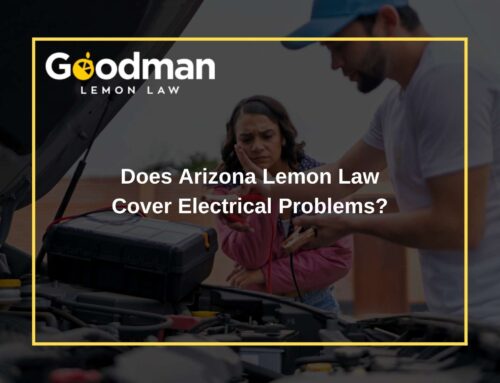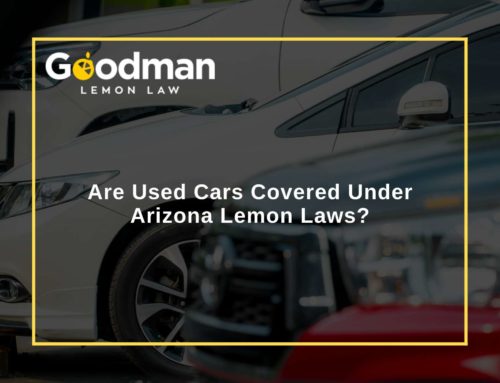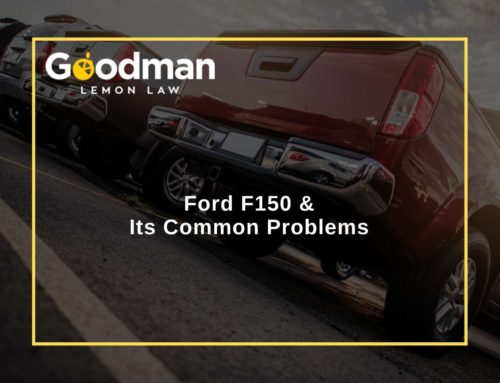Arizonians love their vehicles and relish the opportunity to take a smooth, enjoyable, and long stroll on Arizona’s popular byways and highways. Arizona roads are constructed for smooth driving, and the nearly always perfect weather invites and entices leisurely road trips. Unfortunately, some of the latest models by General Motors (GM) fail to satisfy the owners’ expectations for smooth cruising. Instead, many GM motorists are annoyed by the infamous Chevy Shake. Michael J. Goodman Lemon Law PLLC is here to tell you about the Chevy Shake and what to do if you find this problem in your car.
What You Need to Know About the “Chevy Shake”
Chevy Shake is a recent class-action suit against GM. It is a fault in the car that may appear in the form of extreme vibrations in the suspension, steering system, and even the whole body when it reaches speeds between 65 and 80 mph. The class-action suit alleges that this severe vibration occurs due to a defect in the aluminum driveshaft used by a manufacturer. The suit also alleges that General Motors was aware of the defect and didn’t notify customers.
If you do not own a Chevy but are looking to buy one, then you should learn about the Chevy Shake and what measures or steps to take if you encounter this issue.
Why Does My Chevy Shake?
Many drivers of Chevrolet and other GM vehicles have observed a distracting shake or shimmy in the passenger compartment along with noise from the undercarriage while driving their car, truck, or SUV. They have noticed this vibration often begins when the vehicle reaches 35 to 50 miles per hour, smooths out between 55 and 60 mph, and resumes at 65 mph. This phenomenon occurs not just in older vehicles but in brand new cars as well.
Although the Chevrolet automaker has long denied such vibrations and claims these shakes are normal while driving their vehicles, many drivers of Chevy cars, trucks, and SUVs tell a much different story. As the vehicle accelerates but remains under the typical freeway speed limit, the vibration becomes increasingly severe to the point that even the cups in the cabin vibrate nonstop. The sound can be deafening.
What is Chevy Wind Buffeting?
Chevy Wind Buffeting is an indicator of the Chevy Shake. General Motors refers to this annoying phenomenon as “body pressure booming.” Chevy Wind Buffeting occurs when the driver opens the driver-side window while driving the car at speed. The noise produced in the car becomes extremely loud and frustrating. The driver feels pressure building in the car that can only be canceled out by either shutting all the windows or opening a second window in the vehicle. While the pressure sensation can happen in any vehicle, a car or truck suffering the Chevy Shake syndrome may experience the pressure and noise even if all the windows are closed. Many drivers claim that Chevy Wind Buffeting happens every time they drive, and it’s too much to endure.
This “body pressure booming” and continuous shaking are far more than just a casual frustration while driving. Many GM consumers have reported that being exposed to these issues for a long duration caused them physical distress and even sickness.
Why Does My Chevy Shake at Idle?
Car engines that sound good and idle smoothly show that the gas and air reaching the engine are mixing optimally. Moreover, a properly functioning engine is capable of generating the power required to operate the car’s vital systems such as air conditioning, power steering, cooling system, and electrical system.
If you are experiencing a vibration in your Chevy while it idles, this has nothing to do with Chevy Shake. Some older GM models appear to have a problem with the Vortec engine that experiences an otherwise defect-free shake at idle. This agitation during idling isn’t a big deal on these older vehicles and doesn’t cause illness, such as is reported with the body pressure booming process. If, however, you experience shaking while idling in your late-model Chevy,that can be worrisome. It would be wise to take the car to a mechanic, as this isn’t a known defect in the current models.
The following could be the reasons why it shakes at Idle:
- Dirty or broken spark plugs.
- A loose serpentine belt or timing belt.
- The engine isn’t receiving the proper amount of fuel.
Although shaking at idle may not be related to the Chevy Shake, you should still get it checked out.
Why Does My Chevy Shake When I Brake?
The shaking of a vehicle while pressing the brake feels somewhat the same as the shake at idle. And like the idle shake condition, shaking while applying the brakes also has nothing to do with Chevy Shake for which GM cars and trucks are famous. Vibration when you brake is not just a Chevy problem and may appear in any model and make of vehicle.
Several reasons exist to cause your Chevy to shake while pressing the brake:
- The problem can be within the brake system itself. For example, the brake lines may need to be replaced.
- The problem can be the brake rotors, especially if you observe a shake in your steering wheel while applying the brakes.
- Bad or misaligned brake calipers can cause vibration.
- Defective brake pads can lead to the vehicle shaking when you apply the brakes.
- The wheel cylinders, drums, and shoes can also be the cause for this problem.
As you can see, these issues are only brake related. Thus, it can happen to any vehicle, not to just Chevy cars and trucks.
Was There a Chevy Shake Recall?
The Chevy Shake class-action suit clearly reflects a fault in the aluminum driveshaft. General Motors, however, never issued a recall for this part. The car maker doesn’t even acknowledge the driveshaft as a problem. Therefore, the class action lawsuit continues to move forward.
The only thing General Motors has done regarding this issue is to issue a few information bulletins that suggest possible fixes. None of these bulletins acknowledge the plague of the infamous Chevy Shake, nor have the suggested fixes been of any help to most Chevy owners.
The Chevy Shake Class Action Lawsuits
If you search the internet with the keywords ‘Chevy Shake’, you will find more than 6 million results related to this query. Numerous owners have faced severe shaking while driving their car above 35 mph. Not only does the shaking cause panic among the GM consumers, but it also has allegedly caused some drivers to lose control while driving. With the countless complaints about this vibration problem, several class-action lawsuits have been introduced.
Aside from the original Chevy Shake suit, additional lawsuits have pinpointed two possible causes:
- The aluminum driveshaft
- 8-speed transmission
These class-action lawsuits allege that faulty 8L45 and 8L90 transmissions were fitted in a few of the General Motors SUVs and Trucks. These class-action suits represent drivers that have faced problems with faulty 8L45 and 8L90 transmissions in Cadillac, GM, and Chevrolet vehicles. The affected cars and trucks may experience severe vibration and shaking while the driver accelerates, changes gears, or even slows down.
Class action lawsuits regarding defective transmission covers the following vehicles:
- Chevrolet Silverado 2014 to 2021
- Chevrolet Tahoe 2014 to 2021
- Cadillac Escalade 2015 to 2021
- Chevrolet Suburban 2015 to 2021
- Yukon and Yukon XL 2015 to 2021
- GMC Sierra 2014 to 2020
What is GMT K2XX?
You may have heard that the assembly code GMT K2XX is related to Chevy Shake. This assembly code designates the vehicle platform engineered and developed by General Motors for large SUVs and full-size trucks beginning in 2014. The affected vehicles are built on the GMT K2XX platform, and many drivers believe the shaking is a flaw unique to this assembly code.
How Do I Fix It?
The only solution to the Chevy Shake problem is to install a custom-made driveshaft. This fix, however, can be expensive and consume a lot of time, which is at the heart of the class-action suit. The Chevrolet manufacturing company is believed to be aware of this fact but has taken no action to resolve the matter.
Is it Safe to Drive with a Shaking Chevrolet?
Drivers must decide for themselves whether to take action to fix the problem or simply live with it. Chevy Shake doesn’t affect all vehicles the same way, and to some owners, it is simply a minor frustration. No strong evidence exists to suggest that Chevy Shake is a catastrophic defect. Therefore, consumers technically can continue to drive the vehicles. Still, the physical distress caused by body pressure booming isn’t bearable for some owners. Nausea and wooziness are not only uncomfortable, they can be enough to make a driver lose control while driving. Keeping that in mind, Chevy Shake can potentially cause accidents and even the loss of life.
What to do if Your Chevy Shakes Right After you bought it?
You bought a Chevrolet Vehicle, drove it home, and the next day you realized it shakes inappropriately. What to do? Request a no-cost, no-obligation initial consultation from the nearest office of Michael J. Goodman Lemon Law PLLC in Arizona. Michael can determine if your vehicle falls under one of the Chevy Shake class-action lawsuits. If your vehicle qualifies, you may be entitled to financial compensation. Michael can advise you whether to join one of the existing class-action suits or opt out of a class action and file a personal Lemon Law claim against General Motors. Michael J. Goodman Lemon Law PLLC is the premier Lemon Law firm in Arizona with offices conveniently located in most major cities in the state including Scottsdale and Tempe. Michael Goodman is an unrivaled expert in consumer protection laws for vehicles. Contact Michael J. Goodman Lemon Law PLLC today to request your free, no-obligation initial consultation and find out how quickly you can get out of your lemon.








